AssembiasMBK10Sats¶
- class halotools.empirical_models.AssembiasMBK10Sats(**kwargs)[source]¶
Bases:
AssembiasZheng07SatsPower law model for the occupation statistics of satellite galaxies, introduced in Kravtsov et al. 2004, arXiv:0308519. This implementation uses Zheng et al. 2007, arXiv:0703457, to assign fiducial parameter values, with a second moment defined by a negative binomial distribution, as in Boylan-Kolchin et al. 2010, arXiv:0911.4484, and uses the Decorated HOD to incorporate galaxy assembly bias.
In contrast to MBK10Sats, here the non-Poissonian fluctuations are implemented at fixed primary and secondary halo properties. Note that even in the parent class AssembiasZheng07Sats, fluctuations in satellite occupation statistics are non-Poissonian at fixed primary halo property, which is a generic feature of assembly bias.
The behavior of a negative binomial distribution is controlled by two parameters, n and p. The relationship between these parameters and the mean and variance is as follows:
\(p = \frac{\mu}{\sigma^2}\)
\(n = \frac{\mu^2}{\sigma^2 - \mu}\)
In MBK10Sats, the behavior of the deviations from Poisson behavior is controlled by the parameter
nsat_up0, which can take on any value on the real line. The parameternsat_up0is related to the negative binomial distribution parameter p by a simple sigmoid transformation, which enforces the mathematical constraint \(0<p<1\)For any Poisson distribution, the following relationship between the first and second moments holds:
\(\sigma^2 = \mu\)
In MBK10Sats, changing the parameter
nsat_up0has no effect on the first moment, but the second moment is altered as shown in the figure below.
In terms of two-point correlation functions, deviations from Poisson fluctuations only influence satellite-satellite pair counts, and so the parameter
nsat_up0will strictly influence clustering in the 1-halo term, and the effects will be larger in galaxy samples with larger satellite fractions.- Parameters:
- thresholdfloat, optional
Luminosity threshold of the mock galaxy sample. If specified, input value must agree with one of the thresholds used in Zheng07 to fit HODs: [-18, -18.5, -19, -19.5, -20, -20.5, -21, -21.5, -22]. Default value is specified in the
model_defaultsmodule.- prim_haloprop_keystring, optional
String giving the column name of the primary halo property governing the occupation statistics of gal_type galaxies. Default value is specified in the
model_defaultsmodule.
Methods Summary
mc_occupation([seed])Method to generate Monte Carlo realizations of satellite abundance
non_poissonian_p(**kwargs)Parameter controlling the variance of the negative binomial distribution
std_occupation(**kwargs)Standard deviation of the occupation statistics (square root of the second moment)
Methods Documentation
- mc_occupation(seed=None, **kwargs)[source]¶
Method to generate Monte Carlo realizations of satellite abundance
- Parameters:
- prim_haloproparray, optional
Array of mass-like variable upon which occupation statistics are based. If
prim_halopropis not passed, thentablekeyword argument must be passed.- tableobject, optional
Data table storing halo catalog. If
tableis not passed, thenprim_halopropkeyword argument must be passed.- seedint, optional
Random number seed used to generate the Monte Carlo realization. Default is None.
- Returns:
- mc_abundancearray
Integer array giving the number of galaxies in the input halos
- non_poissonian_p(**kwargs)[source]¶
Parameter controlling the variance of the negative binomial distribution
- Parameters:
- prim_haloproparray, optional
Array storing a mass-like variable that governs the occupation statistics. If
prim_halopropis not passed, thentablekeyword arguments must be passed.- tableobject, optional
Data table storing halo catalog. If
tableis not passed, thenprim_halopropkeyword arguments must be passed.
- Returns:
- pfloat or array
- std_occupation(**kwargs)[source]¶
Standard deviation of the occupation statistics (square root of the second moment)
- Parameters:
- prim_haloproparray, optional
Array of mass-like variable upon which occupation statistics are based. If
prim_halopropis not passed, thentablekeyword argument must be passed.- tableobject, optional
Data table storing halo catalog. If
tableis not passed, thenprim_halopropkeyword argument must be passed.
- Returns:
- std_nsatarray
Standard deviation of the number of satellites in the input halos.
Notes
At fixed value of the non_poissonian_p parameter
nsat_up0, the quantity x = std_occupation**2 / mean_occupation is a constant. Increasing up0 will decrease x with no change to mean_occupation. In the limit of infinite up0, x approaches the Poisson value of unity